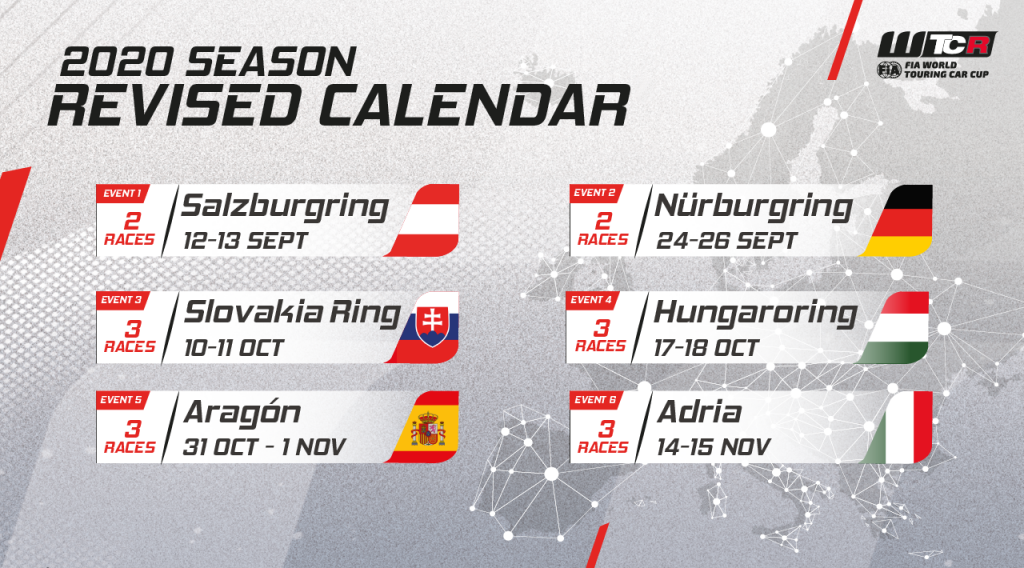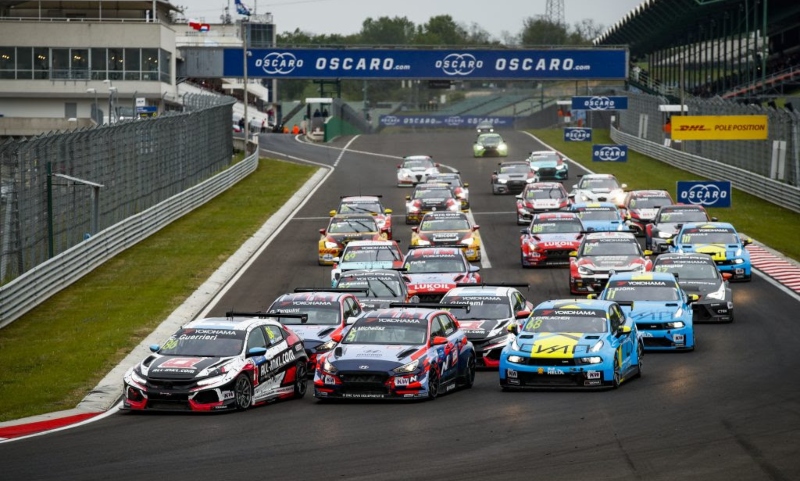 *Planned September to November schedule realistic and responsible in challenging times *Asia events fully supportive of Europe-only move with a return to the region for 2021 *80% of the proposed number of scheduled races are maintained *Cooperation and understanding of FIA and all stakeholders acknowledged *Thoughts remain with all those affected by the coronavirus pandemic
*Planned September to November schedule realistic and responsible in challenging times *Asia events fully supportive of Europe-only move with a return to the region for 2021 *80% of the proposed number of scheduled races are maintained *Cooperation and understanding of FIA and all stakeholders acknowledged *Thoughts remain with all those affected by the coronavirus pandemic
The WTCR − FIA World Touring Car Cup calendar has been restructured for 2020 in order to deliver the maximum number of events possible during these unprecedented times.
With so many people suffering as a result of the ongoing coronavirus pandemic, the priority remains to adhere to official guidelines and avoid compromising the health and safety of all, while ensuring essential workers can carry out their duties.
However, as the WTCR promoter, Eurosport Events has a duty to do all it can to maintain a calendar that’s not just credible in sporting terms, but one that is socially and economically responsible. This is necessary to help protect the jobs of all those who are reliant on the income possibilities, be they customer racing departments, event promoters, suppliers, teams, media or otherwise.
To safeguard the 2020 season, Eurosport Events has proposed to the FIA and all WTCR stakeholders a drastic plan based on a restructured 16-race calendar over six weekends.
An extremely challenging and ever-changing situation has led to a number of difficult decisions being taken. Central to this is a move to run all race weekends in Europe with the traditional four-event Asia leg unfortunately not possible in 2020.
The proposals were approved at a meeting of the FIA Touring Car Commission on 26 May and received full FIA ratification.
To protect and serve: Eurosport Events and the FIA hard at work to continue success of WTCR
Season three of the WTCR − FIA World Touring Car Cup won’t be without its challenges and compromises, but every effort is being made to continue the success of the category as follows:
*Calendar revised so 80 per cent of the original number of races is possible in order to protect the WTCR, protect jobs and protect the sport as a whole
*Europe-only schedule puts the onus firmly on economic and social responsibility and is far less complex logistically
*Planning 16 races − which is possible due to the WTCR’s sprint format and cost-capping measures already implemented by the FIA −maintains the sporting credibility of the series and meets the requirements of the numerous global broadcasters
*With Eurosport Events not reducing its marketing and promotional investment, the global exposure and popularity enjoyed by the series, its partners and stakeholders is not adversely affected
WTCR – FIA World Touring Car Cup revised calendar 2020 (proposed)
It is hoped the schedule below can be achieved in accordance with all government restrictions:
WTCR Race of Austria (Salzburgring, 12-13 September), 2 races
WTCR Race of Germany (Nürburgring Nordschleife, 24-26 September), 2 races
WTCR Race of Slovakia (Slovakia Ring,10-11 October), 3 races
WTCR Race of Hungary (Hungaroring, 17-18 October), 3 races
WTCR Race of Spain (MotorLand Aragón, 31 October-1 November), 3 races
WTCR Race of Italy (Adria International Raceway, 14-15 November), 3 races
The planned calendar changes in short
*Races in Austria, Slovakia and Spain rescheduled to dates above, new event in Italy at Adria
*Germany and Hungary events reinstated having initially dropped off calendar due to restrictions
*Local planning and resource issues sadly prevent WTCR Race of Portugal in Vila Real from taking place in 2020, but a return for the street race’s 90th anniversary in 2021 is a key target
*Unfortunately for 2020, the races in China, Macau, Malaysia and South Korea will not run
*All races will therefore be in Europe in 2020 with the hope of returning to Asia in 2021, where strong relationships remain with the event promoters
Q&A: François Ribeiro
François Ribeiro, Head of Eurosport Events, the WTCR promoter, has answered these key questions.
Why a Europe-only calendar for 2020?
“The priority has always been to run as many races as possible to protect the WTCR, protect jobs and protect the sport at a time when there is no clear visibility in terms of how the pandemic will evolve and what decisions governments will take. To commit to races outside Europe required certainties that were very uncertain to obtain.”
What certainties did you seek?
“The events in Asia made up 40 per cent of the original calendar. For the Asia leg to go ahead, the freight must be shipped from Europe at the end of July. Right now, it is simply not possible to predict what restrictions will still be in place by then with a very real chance of a second wave of COVID-19 a fundamental consideration. The pandemic has caused significant disruption to international cargo movement, flight schedules have been decimated and there is no clarity on when these services will function properly, what restrictions there will be and we must respect the fact that quarantine measures will remain in place in some countries for months. We also have to consider if racing so far from home and the expense that brings is the right and responsible thing to do from an economic and social point of view. Then there is the safety and wellbeing of our participants and the wider communities in those countries in Asia we were due to visit.”
Do you expect any issues to affect the proposed European events?
“We will follow all official guidelines in conjunction with the FIA, local promoters and governments before each event is given the green light as we will never compromise safety. While it will not be straightforward, holding races in Europe will negate the need to fly to events and measures will be taken to maximise vehicle-sharing and train travel, while respecting any social distancing requirements that might still be in place. Remaining in Europe, where all teams and suppliers are based, offers significant flexibility should any further calendar changes be required at short notice.”
But are you not jumping the gun if the situation in Asia soon normalises?
“The events in Asia have been pivotal to the success of WTCR and we thank the events in China, Macau, Malaysia and South Korea, plus Honda, Hyundai and Lynk & Co for their support and understanding. Of course, we would like nothing more than for life to return to normal, but we have to be sensible. If we further delay the decision to cancel the Asia leg into June, I can guarantee there will not be any spare slots at European tracks later in the year due to the huge amount of rescheduling that’s required, not just by WTCR but the many other events, series and championships. We must also be realistic: the economic impact caused by COVID-19 is massive and will hurt motorsport for a long period, so the running cost reduction is not only an obligation for 2020, but it will also be a priority for 2021.”
What format will the six events follow?
“The intention is to run two free practice sessions, one three-phase qualifying session and three races at each event, apart from WTCR Race of Austria at Salzburgring and WTCR Race of Germany at the Nürburgring Nordschleife where there will be two races. Going from 10 to six events makes it possible to restore the three-races-per-weekend format at most events, which we are doing to preserve the sporting creditability of the series and meet the requirements of our global broadcast partners. Unlike other series, WTCR is in a fortunate position that its sprint-style race format makes it possible to schedule up to three races per weekend. Furthermore, it has been agreed that there will not be a collective pre-season test.”
Adria is a new event on the WTCR calendar. Why this venue and what will it bring?
“Touring car racing has a rich heritage in Italy. It’s where the FIA World Touring Car Championship began in 1987, it’s where it was revived in 2005 and it’s where the inaugural WTCR winner Gabriele Tarquini comes from. And while it’s exciting to be bringing the WTCR to the passionate Italian fans, we are also very excited at the prospect of being able to race on the extended Adria track layout, as well as being able to benefit from the excellent facilities, including a high-quality lighting system, and convenient location.”
Can the WTCR retain its ‘World Cup’ status with events only taking place in Europe?
“The FIA and President Jean Todt are being very supportive during what is an unprecedented and rapidly evolving global situation and we very much acknowledge this assistance. We must also thank the FIA Touring Car Department for the work it has done to amend the sporting regulations so they are applicable to the restructured calendar.”
Was a ‘super-season’ with events either side of the calendar year not a possibility?
“We must be realistic and accept the economic impact of the coronavirus pandemic will be felt by society and the automotive and motorsport industries, in particular, for years not months. We therefore must deliver a calendar that’s sustainable, not just in 2020 but in 2021 as well and that means fewer events than the traditional 10 per year this year and next year also. We reasonably think 16 races over eight events in two continents would be a good balance for next year.”
How have the WTCR teams reacted?
“This is an extremely tough period for them and we are doing everything we can to protect them. A calendar of six events in Europe is more logistically possible and financially achievable and provides a vital revenue stream, not just for the teams but the suppliers.”
Finally, what is your message to the fans of WTCR?
“A huge thank you for your support and patience but please follow the official advice from your government. We are keeping our social media channels busy with Esports WTCR, replays and original content from the drivers. We badly want to be on track as soon as possible but only when it is safe and right to do so.”

































